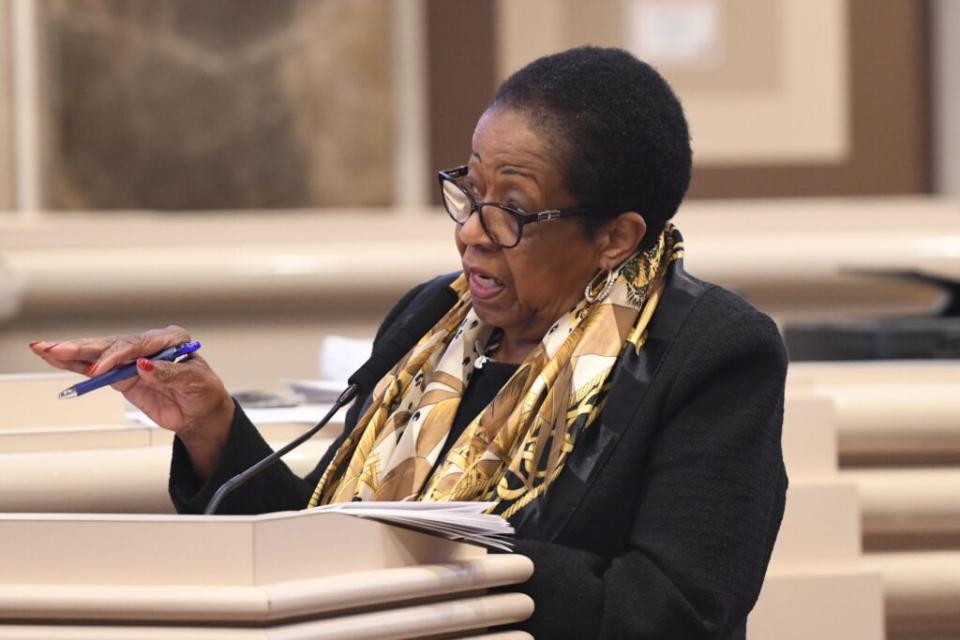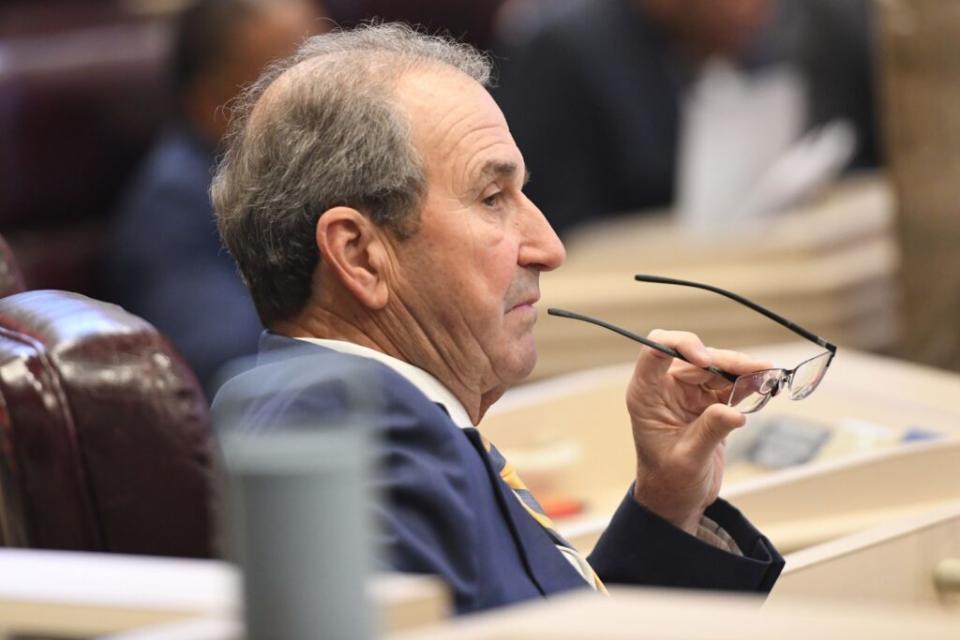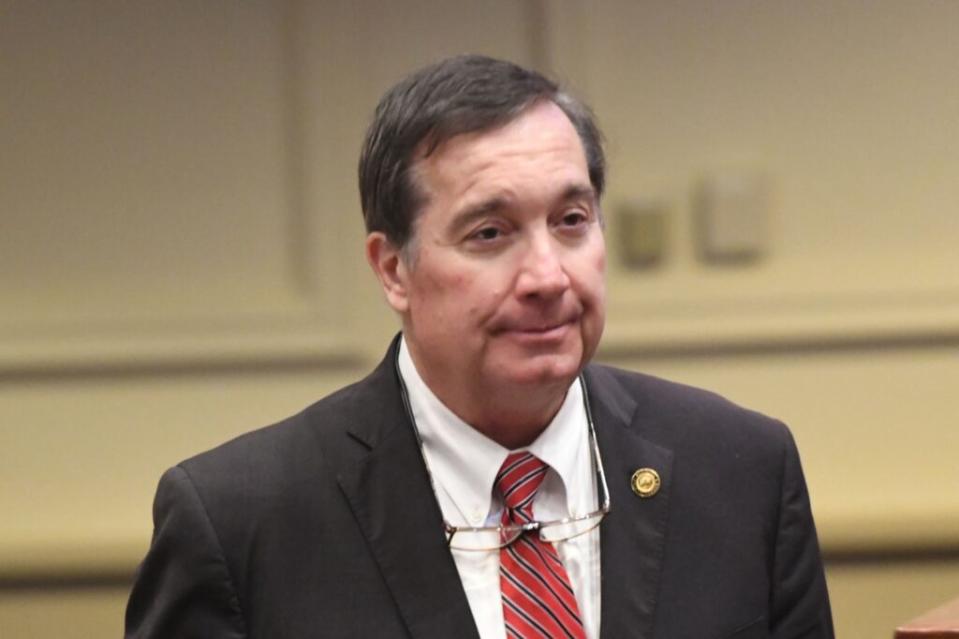Gambling package suddenly emerges, then stalls in Alabama Senate

- Oops!Something went wrong.Please try again later.
Rep. Chris Blackshear, R-Smiths Station (right) speaks with House Rules Committee Chair Joe Lovvorn, R-Auburn, on the floor of the Alabama House of Representatives on April 30, 2024 at the Alabama Statehouse in Montgomery, Alabama. (Brian Lyman/Alabama Reflector)
A constitutional amendment to allow some forms of gambling and a lottery in the state passed the House Tuesday but stalled in the Senate after a vote and an obscure procedural rule.
The House approved a conference committee report on HB 151, a constitutional amendment authorizing a lottery and limited gambling, on a 72-29 vote. HB 152, legislation setting up taxation and regulation of gambling, passed the chamber 70-29, with one abstention.
But later in the evening, the Senate voted 20-15 on HB 151, one vote short of the three-fifths approval it needed as a constitutional amendment. That appeared to kill the bill, but a second vote was called and the conference committee report was carried over.
Pat Harris, Secretary of the Senate, told reporters that conference committee reports are items, so they need a majority to pass. But since HB 151 is a constitutional amendment, it would need a second vote, and would need at least 21 votes to pass.
The 20-15 vote by the Senate, he said, fulfilled the need to adopt the committee report as a majority, but the body carried the bill over before the second vote to approve it as a constitutional amendment.
The bill can now be pulled from the basket at a later date and is still alive.
Harris said he can recall one other occasion in his 128 sessions that a constitutional amendment conference committee report had to be voted on twice.
Senate President Pro Tempore Greg Reed, R-Jasper, said it was a “test vote.”
“We had a vote,” he said. “We understood where the votes were. The bills were carried over and so we’ll see what next.”
Sudden breakthrough
The votes came just hours after a conference committee suddenly broke through a weeks-long stalemate over the legislation between the Alabama House and Senate.
“It authorizes the Alabama educational lottery to be a paper only,” said Rep. Chris Blackshear, R-Smiths Station, the sponsor of the bill, at a conference committee meeting on Tuesday afternoon. “It also can participate in multi-state lotteries: the Mega Millions, Powerball, and such. It also authorizes electronic games of chance at seven locations contained in the Senate bill that was passed,” Blackshear said.
Democrats in both chambers all supported the legislation, while opposition came from within the majority Republican caucus.
The package includes a lottery to fund education; authorizes up to seven different casinos that can slot machines and other “electronic gaming devices;” and directs Gov. Kay Ivey to enter a compact with the Poarch Band of Creek Indians, a federally-recognized tribe that runs casinos in Atmore, Montgomery and Wetumpka.
The proposal does not include sports betting, which had been part of a package passed by the House in February. The Senate in March stripped down the proposal to a lottery and a compact, leading to a weeks-long face-off between the chambers.
The compromise measure also restores House language that would allow the Legislature to appropriate lottery revenue to education programs, including postsecondary scholarships and bonuses to state education employees and retirees. It allows gaming revenue from other sources to go to other programs, including mental health and rural health care.
Sen. Greg Albritton, R-Atmore, stands on the floor of the Alabama Senate on Feb. 8, 2024 in Montgomery, Alabama. (Brian Lyman/Alabama Reflector)
Sen. Greg Albritton, R-Atmore, a member of the conference committee who handled the gambling package in the Senate, told reporters that language around rural healthcare, which included wording similar to Medicaid expansion, was in the bill as part of the guidelines of how the money could be spent. House Democrats, whose support was critical to the bill passing in February, insisted on the Medicaid expansion language being included.
Albritton also later confirmed over text that mental health was allowed under the guidelines.
The Alabama Constitution bans lotteries and games of chance. Local amendments authorize some forms of gambling, though the Alabama Supreme Court in the last 15 years has taken narrow readings of those amendments. The legislation would repeal local amendments and prohibits further ones.
Albritton told reporters after the committee meeting that there were recent estimates that revenue would be around 50% more than the Senate version. The estimates for the Senate version as passed committee in March were $350 million, compared to up to $1.2 billion in the House version.
“Now, what does that mean?” said Albritton. “I don’t really know, probably we were estimating maybe $400 million. I think we’re going to be looking at closer to six, 650. Those are the estimates.”
Albritton also said after the meeting that the compact is not a guarantee. A spokesperson for the Poarch Band declined comment on Tuesday.
Should the Senate approve the measures, a vote on the constitutional amendment will take place on Aug. 20.
Strong House support
Rep. Laura Hall, D-Huntsville, asks a question during a debate in the Alabama House of Representatives over gambling legislation on Feb. 15, 2024. The House approved a constitutional amendment that would create a state lottery and allow casino gambling and sports wagering in Alabama. (Brian Lyman/Alabama Reflector)
Blackshear said during the conference committee on Tuesday that the electronic games of chance locations were the seven ones from the Senate bill: racetracks at Greene, Jefferson, Macon and Mobile; and bingo hall locations in Greene, Houston and Lowndes County. Licensees would be required to meet a suitability study, and would be taxed at a rate of 20-28%, similar to the rate in the Senate version.
The bill uses Senate language on the gambling commission and criminal laws.
In the House, many representatives who spoke in favor tried to establish a record of the benefits of passing the legislation.
Rep. Laura Hall, D-Huntsville, asked Brashear he was comfortable in saying “this is the best product that we have before us and the best opportunity for making sure that we are going to provide so many of the resources that are necessary for our children that otherwise would not happen if we do not vote yes on this.”
Blackshear said the compromise that came out of conference committee “is the best piece of legislation that we have to move forward to give the people an opportunity to vote.”
Rep. Chip Brown, R-Hollinger’s Island, also spoke in support of the compromise.
“I know this has been a process that has been going on for well over a year, I mean, this isn’t something that was just thrown together haphazardly,” he said.
The last vote on a lottery in Alabama took place in 1999. Brown, who lives in Mobile County, said that living in a county that borders Mississippi and is not too far from Florida means seeing people driving to those states to buy lottery tickets.
“What we’re doing is we’re funding their programs in Mississippi. We’re funding them in Florida. We’re funding them in Georgia. We’re funding them in Tennessee. We’re paying for their kids to go to school,” Brown said.
Legislators from the coastal counties expressed opposition to casinos in their areas, and Rep. Matt Simpson, R-Daphne, asked Blacksher if the bill allowed casinos in Baldwin County. Blackshear said that the way the bill was written, that would be impossible.
Blackshear said that the bill does not allow for transfers to another part of the state, and it would require a constitution amendment to issue additional licenses.
Simpson said that people have suggested that “the beach is going to be the next Atlantic City.”
“There will not be casinos at the beach. There will not be casinos at OWA and Baldwin County will be casino free,” Simpson stated.
Rep. Ontario Tillman, D-Birmingham, said they have an opportunity to improve education in the state.
“We have an opportunity to enhance education in the state of Alabama, which should be paramount to all of us who are in here in representing the people because this is the people’s house,” he said.
Rep. Barbara Boyd, D-Anniston, said this is not a Republican or Democratic issue, but an issue of the future.
“This will be an opportunity for those who are the least among us to be able to get an education,” she said.
Rep. Steve Clouse, R-Ozark, listens to the Alabama House of Representatives debate gambling legislation on Feb. 15, 2024 in Montgomery, Alabama. The House approved a constitutional amendment that would create a state lottery and authorize casino gaming and sports wagering. (Brian Lyman/Alabama Reflector)
Rep. Steve Clouse, R-Ozark, who sponsored lottery bills in the past, said this has been a complicated issue that been a “daunting task” for years. “The whole issue has become so complicated now that it took comprehensive piece of legislation like this, including the lottery, including the Gaming Commission, where we can put some type of regulations in place here to control these illegal operations and to try to bring in revenue all in all at the same time,” Clouse said.
Rep. Arnold Mooney, R-Indian Springs, spoke in opposition to the compromise, calling gambling a public health concern. He cited an editorial piece from The Lancet, a medical journal focused on public health, that said gambling has been understudied, but that should stop regulation to reduce potential harm.
“I personally believe that we need to try to protect the health and well-being of children, minor children and their families by restricting gambling, especially advertising marketing sponsorships,” he said.
Senate opposition
Sen. Dan Roberts, R-Mountain Brook, walks across the floor of the Alabama Senate on April 16, 2024 at the Alabama Statehouse in Montgomery, Alabama. (Brian Lyman/Alabama Reflector)
Senators who opposed the bill were far more vocal.
Sen. Dan Roberts, R-Mountain Brook, said that he would continue to be opposed to the gambling legislation and said it would exploit people.
“I don’t think 10 or 20 years from now Alabama will be better as a result of us passing this constitutional amendment,” he said.
Albritton, who handle the bill in the Senate, said that there were misconceptions about what was happening. He said that these bills were not the state condoning gambling but rather about trying to control it.
But Albritton ultimately voted against the measure. He said the bills “took some moves in areas that I was unable to influence, to gain the room that I needed along those lines, to vote yes.”
Senate Minority Leader Bobby Singleton, D-Greensboro, said that the Senate told the House of Representatives after 2021 that they wouldn’t vote on another gambling bill unless it came from the House. He said the House gave them a bill, and they tore it apart.
“This is not a perfect bill,” he said. “I could find a million things wrong with it, but I’m willing to give the people of the state of Alabama the right to vote.”
Singleton and Albritton said they had worked together and against each other on different pieces of gambling legislation over the years.
“So we’re at this crossroad that we’ve never been here before,” Singleton said.
Sen. Shay Shelnutt, R-Trussville, said that he wanted the current laws enforced. Albritton asked if he wanted an enforcement arm for gambling.
“We have an enforcement arm that could already do that, they choose not to,” Shelnutt said.
Updated at 12:05 a.m. with Senate votes and comments.
The post Gambling package suddenly emerges, then stalls in Alabama Senate appeared first on Alabama Reflector.





